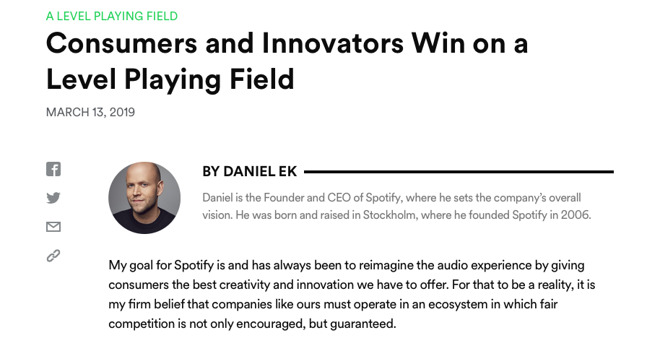Spotify accuses Apple of anti-competitive practices in Europe over App Store restrictions
Music streaming company Spotify has filed a complaint with the European Commission claiming that Apple takes more money than it should be entitled to, isn't providing information on customers to vendors, and is unfairly limiting third-party access to technologies such as Siri, HomePod and Apple Watch.

Spotify has filed an official anti-competition complaint about Apple with the European Commission. The company, which competes directly with Apple Music, alleges that Apple is artificially limiting innovation and constraining user choice by refusing to allow Spotify and other firms access to technology and information via the App Store.
Daniel Ek, founder of Spotify, announced the complaint on the company's blog.
"Apple is both the owner of the iOS platform and the App Store -- and a competitor to services like Spotify. In theory, this is fine. But in Apple's case, they continue to give themselves an unfair advantage at every turn," Ek said. "After trying unsuccessfully to resolve the issues directly with Apple, we're now requesting that the EC take action to ensure fair competition."
As an example, Ek describes Apple's 30 percent cut of purchases made on the App Store as a tax.
"If we pay this tax, it would force us to artificially inflate the price of our Premium membership well above the price of Apple Music," wrote Ek. "And to keep our price competitive for our customers, that isn't something we can do."

Spotify's blog announcing the complaint
"If we choose not to use Apple's payment system," he continues, "Apple then applies a series of technical and experience-limiting restrictions on Spotify. Over time, this has included locking Spotify and other competitors out of Apple services such as Siri, HomePod and Apple Watch."
Ek further says that third-party developers are also locked out of information regarding customers. "For example, they limit our communication with our customers-- including our outreach beyond the app," he writes. "In some cases, we aren't even allowed to send emails to our customers who use Apple."
Spotify does have an Apple Watch app but it is limited to being a remote control for music played on iPhone or Spotify Connect devices, not the watch itself.
The company has not issued a copy of the complaint it has sent to the European Commission, but it has set out a list of what it wants to see happen. Ek says Spotify is first asking that all apps "should be able to compete fairly on the merits, and not based on who owns the app store".
Then the company wants users to have a choice of being able to pay subscriptions directly to Spotify through the App Store, yet without Apple's cut. Lastly, Spotify wants app and service developers to get access to customers for marketing and promotions.
The latest figures available show that in November 2018, Spotify was maintaining a lead on Apple Music with 87 million paid subscribers. The firm has recently partnered with Hulu to offer subscriptions and bought podcasting companies in order to compete with iTunes.
Apple has yet to comment publicly on the complaint.

Spotify has filed an official anti-competition complaint about Apple with the European Commission. The company, which competes directly with Apple Music, alleges that Apple is artificially limiting innovation and constraining user choice by refusing to allow Spotify and other firms access to technology and information via the App Store.
Daniel Ek, founder of Spotify, announced the complaint on the company's blog.
"Apple is both the owner of the iOS platform and the App Store -- and a competitor to services like Spotify. In theory, this is fine. But in Apple's case, they continue to give themselves an unfair advantage at every turn," Ek said. "After trying unsuccessfully to resolve the issues directly with Apple, we're now requesting that the EC take action to ensure fair competition."
As an example, Ek describes Apple's 30 percent cut of purchases made on the App Store as a tax.
"If we pay this tax, it would force us to artificially inflate the price of our Premium membership well above the price of Apple Music," wrote Ek. "And to keep our price competitive for our customers, that isn't something we can do."

Spotify's blog announcing the complaint
"If we choose not to use Apple's payment system," he continues, "Apple then applies a series of technical and experience-limiting restrictions on Spotify. Over time, this has included locking Spotify and other competitors out of Apple services such as Siri, HomePod and Apple Watch."
Ek further says that third-party developers are also locked out of information regarding customers. "For example, they limit our communication with our customers-- including our outreach beyond the app," he writes. "In some cases, we aren't even allowed to send emails to our customers who use Apple."
Spotify does have an Apple Watch app but it is limited to being a remote control for music played on iPhone or Spotify Connect devices, not the watch itself.
The company has not issued a copy of the complaint it has sent to the European Commission, but it has set out a list of what it wants to see happen. Ek says Spotify is first asking that all apps "should be able to compete fairly on the merits, and not based on who owns the app store".
Then the company wants users to have a choice of being able to pay subscriptions directly to Spotify through the App Store, yet without Apple's cut. Lastly, Spotify wants app and service developers to get access to customers for marketing and promotions.
The latest figures available show that in November 2018, Spotify was maintaining a lead on Apple Music with 87 million paid subscribers. The firm has recently partnered with Hulu to offer subscriptions and bought podcasting companies in order to compete with iTunes.
Apple has yet to comment publicly on the complaint.

Comments
Personally I think there's a good chance this gets the Commission's attention. The typical "Apple isn't a monopoly" chant won't be the deciding factor there IMO.
EDIT: Spotify lays out their general complaints explained here, the formal one is under seal still.
https://timetoplayfair.com/
I guess I should be able to use that lovely gym equipment in the gym, and not pay for it?
/s
Now Spotify jumps in with blather about "an ecosystem in which fair competition is not only encouraged, but guaranteed."
Whose and what "ecosystem" is this guy talking about? Some magical ecosystem that fell like manna from heaven for the benefit of everyone in this highly competitive market struggling to win over the same set of customers? Business ecosystems don't just happen like, they are complex systems that are purpose-built, and at great expense. Ecosystems are not the same as "markets" either. Apple is in the streaming music market just like Spotify is in the music streaming market. But Apple has built a massive ecosystem to support their foray into this market - but only after they effectively rescued the whole music industry with 99 cent music purchases on iTuness.
Spotify has created nothing. They are simply leeches who suck profits from the creativity of others at the lowest possible cost to themselves.
I'll have to issue the Total BS card to this guy. Apple bought and paid for their "ecosystem." If Spotify wants to play in Apple's ecosystem they have to pay-to-play to enjoy the fruits of Apple's labor. Or they can build their own ecosystem. Get to work Spotify. Send the lawyers packing and hire some engineers. Create something.
I understand that the accusation Spotify is making here only relates to Apple's actions and wouldn't necessarily reflect on its own actions. But I wouldn't be surprised if regulators soon start targeting, e.g., Spotify and Apple and some of the large labels for alleged anti-competitive dealing.
I obviously don't know what went on behind the scenes when the licensing deals were worked out. And I myself don't have a problem with how the streaming music model works. I'm also not a general proponent of how anti-trust laws work. I think governments go too far in regulating some business conduct which should be allowed. But, with all that said, the industry has effectively agreed on a retail price (or set of prices) which music streaming services will be sold at. Spotify and Apple dominate the paid music streaming markets. And they're only able to operate because large music labels have agreed to let them offer services at, e.g., $10 a month and take, e.g., $6 of that. Is there actual vertical and/or horizontal price fixing? I doubt it. But that wouldn't stop overzealous regulators from trying to (and perhaps successfully) making the case that, in effect, there is. Horizontal price fixing (on the part of labels) accomplished through mutual vertical business relationships?
During the initial years of the App Store, its main contribution was to lock customers into the Apple ecosystem and have them buy more Apple hardware - where Apple made most of its profits. It's not so different from all the ancillary services that Google provides such as News or Gmail which make no money in itself (News has no ads) or very little money (Gmail ads do not seem to make enough money to pay for Gmail development) - but they are important referral services for Google's main money maker which is search.
One could argue that after creating this robust ecosystem, Apple is now using it as a money maker on its own plus it gradually introduces first party services to replace some of the most important apps on the App Store so it can capture 100% rather than 30% of profits.
This change will raise concerns over time. The questions for regulators will be if Apple has enough monopoly power. Regulators expect all companies to behave badly and exploit consumers but competition constrains their behavior. Whether there is enough competition always comes down to how you define the market. At first sight, Apple only has a minority market share in hardware. However, some regulators might argue that Apple has a monopoly among those who use Apple products because (a) switching costs are getting more and more expensive (Facetime, App Store, Apple Watch working with iOS devices only etc.), (b) there is no choice outside the App Store to get apps and (c) many app creators make most of their profits from iOS devices despite the lower market share because households with Apple devices tend to be wealthier and many apps are first developed for iOS.
https://timetoplayfair.com/facts/
so, they in fact don’t actively promote their platform so, they should not be charging at all I guess.
The ball is now rolling. We'll see how far it gets but I have the feeling that the Commission will run with this one.
You’re also confusing “market” with “ecosystem.” I realize that using the word “ecosystem” is trendy and conveys an organic quality, but a more accurate term for business and industry would simply be “system.” Apple created and paid for the development of a private business system that allows for third party participation. The participation of third parties in Apple’s business system requires payment in the form of fees. These fees offset Apple’s costs and expenses for building and maintaining their private business system and for the services that Apple is providing to their partners, including but not limited to providing a storefront, payment system, repository, app approval, access to a large base of customers, etc.
Oh, and don’t forget that Apple is only one such provider of such a business system. Google, Amazon, and Microsoft are all providing similar systems. None of these emerged from the soil, they were all bought and paid for by huge private corporate investments.